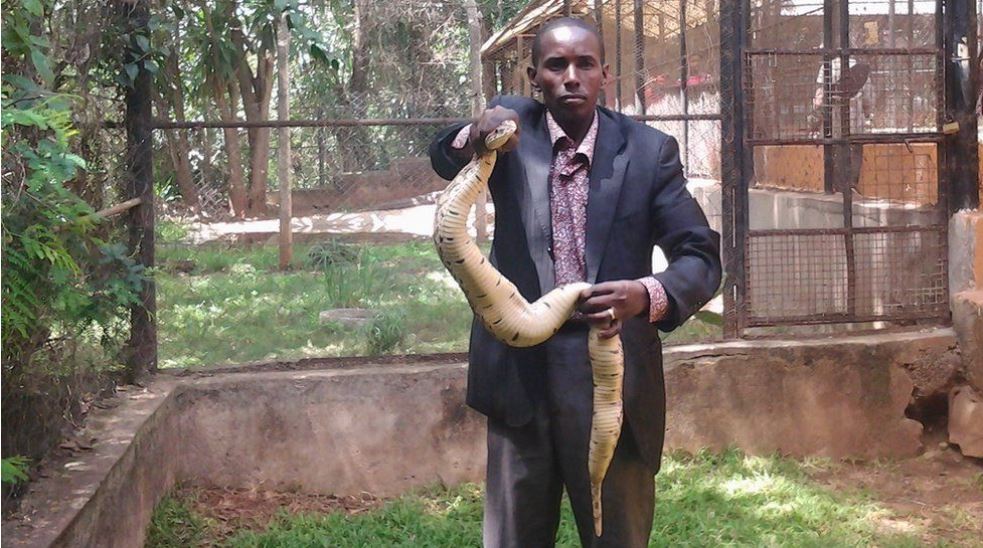When Presidential aspirant Prof George Wajackoyah pledged to introduce snake farming in Kenya if he is elected the 5th president of Kenya, many people were shocked as it sounded weird and risky business.

Speaking at Citizen TV’s JKL show on 8 June, the Professor said Kenya has many snakes that can be used for economic purposes.
“Kenya has many snakes, we will catch most of them and extract the poison for making medication and give the meat to Chinese to eat and help offset our debts,” he noted.
“A lot of people are bitten by snakes in this country and we have to wait for snake doses from outside the country from pharmaceutical organisations,” the presidential candidate said.
Most Kenyans are yet to accept that this is a lucrative business and could help the country generate millions of income.
To demonstrate this, we take a look at some of the passionate snake farmers in Kenya who love what they do with the reptiles.
The two farmers Makau Kioko and David Musyoka were interviewed by the BBC under Cobra fang club: The rising popularity of Kenyan snake farms where they gave a lot insights into this dangerous business.
Here’s their story:
Cobra fang club: The rising popularity of Kenyan snake farms
The visiting audience always looks on with apprehension when Makau Kioko crouches down to grab an Egyptian cobra.
The 53-year-old will be bitten by one of Africa’s most deadly snakes if his timing is off – and he is playing with split seconds.
Mr Kioko, the owner of the snake farm and visitor attraction Kioko Snake Ventures, in Kitui, eastern Kenya, he says he “always makes sure he wins” his cobra grapples.
However, one of his workers wasn’t so lucky a few years ago, and did get bitten by one of the cobras.
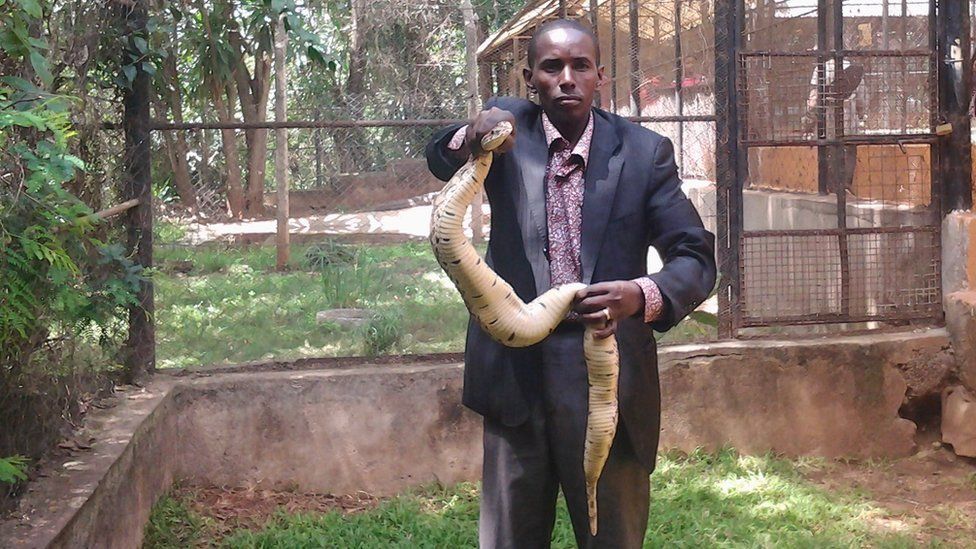
While the farm keeps stocks of anti-venom, it wasn’t administered quickly enough to prevent the man’s legs being paralysed, and they subsequently had to be amputated.
Another member of staff died of his injuries after being crushed by a huge African rock python, the continent’s largest snake.
“The snake felt threatened as the man attempted to get close to it to feed it a live adult goat,” Mr Kioko says.
“It quickly wrapped its body around him and squeezed him. It didn’t eat him, pythons rarely eat humans, but he died.”
Tourist attractions
Although being a snake farmer has its obvious risks, it is a growing industry in Kenya.
There are now 42 such farms in the country, and a further 21 are awaiting licensing approval, according to the government body responsible for regulating the sector, the Kenya Wildlife Service.

The farms primarily make their money as tourist attractions that charge visitors.
They also export snakes, mainly to zoos and pet shops in Europe and North America, where the best and biggest examples are sold for more than 10,000 Kenyan shillings ($100; £80). Snakes are also sold for venom harvesting and scientific research, both domestically and overseas.
Despite occasional fatalities and other injuries, staff at the farms are required to have relevant qualifications, such as diplomas in animal management.
Mr Kioko and his 16 employees look after more than 1,800 snakes, half of which are pythons. The other 50% include more than 32 different African species, plus 13 that are native to other continents.
On a good day Mr Kioko says his five-acre (two-hectare) farm, which opened in 2009, now attracts more than 350 visitors. Kenyans are charged 300 shillings, while overseas tourists have to pay an entrance fee of 1,000 shillings.
In addition to watching Mr Kioko’s daredevil cobra act people can learn all about the snakes, and see them up close.
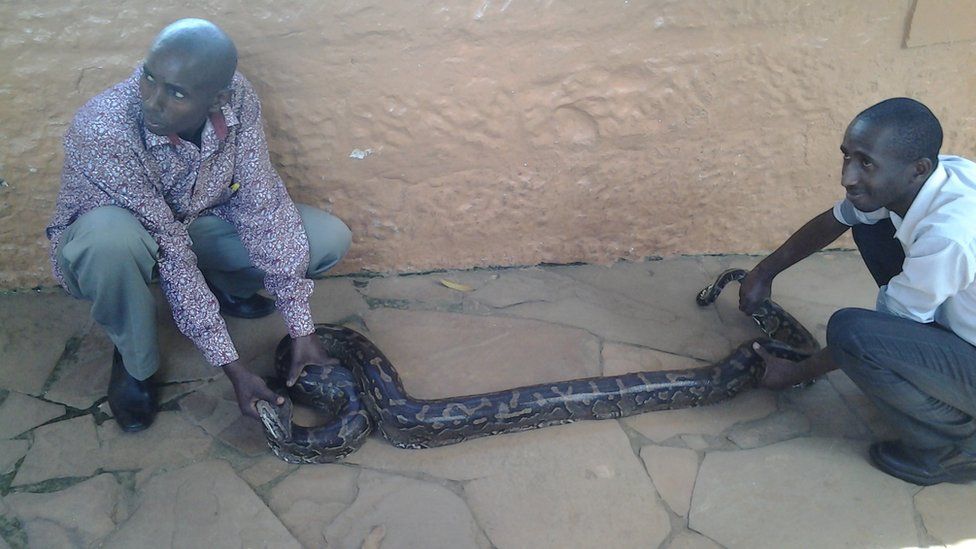
To keep the snakes happy and healthy at the facility he says they have to be given as much living space as they need. This means outdoor enclosures for the largest specimens.
Some of the snakes Mr Kioko breeds, others he rescues.
“Snakes invade people’s homes and bite them,” he says. “I’m then called out to capture the animals from their homesteads. In return I keep them, and raise them on my farm.”
Theft risk
Another Kenyan snake farmer is David Musyoka, who has more than 220 snakes at his facility in Meru County, eastern Kenya.
His collection includes the venomous Mount Kenya Bush Viper, and milk snakes, which are native to North and South America. Visitors are charged 300 shillings, with an average of 50 people visiting per day.
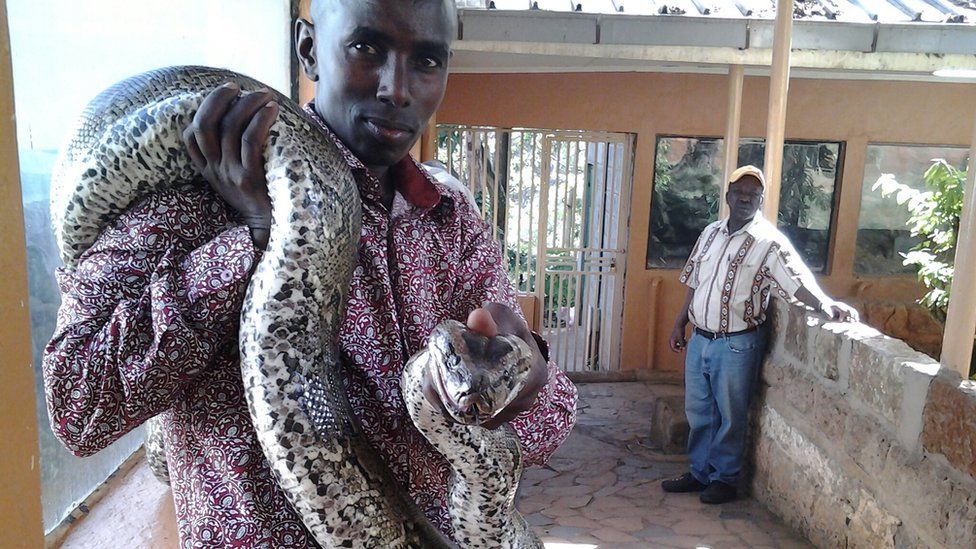
The 54-year-old says: “I also export to zoos in the Czech Republic, UK, Germany, US, Mexico and Brazil. Also, China is an emerging market.”
While he says he is happy with the business, he does have to endure the occasional break-in.
“I have had incidents when people have invaded my farm, stolen a few snakes, and illegally sold them to witch doctors,” says Mr Musyoka. “Others sell the meat on the black market, so these are some of the challenges.”
Albert Otieno, a senior reptile curator at the National Museum of Kenya, says that while snake farms can bring in a steady income, they require significant start-up capital which can be hard to come by. He adds that Kenyan banks like to give money to established businesses rather than unproven start-ups.
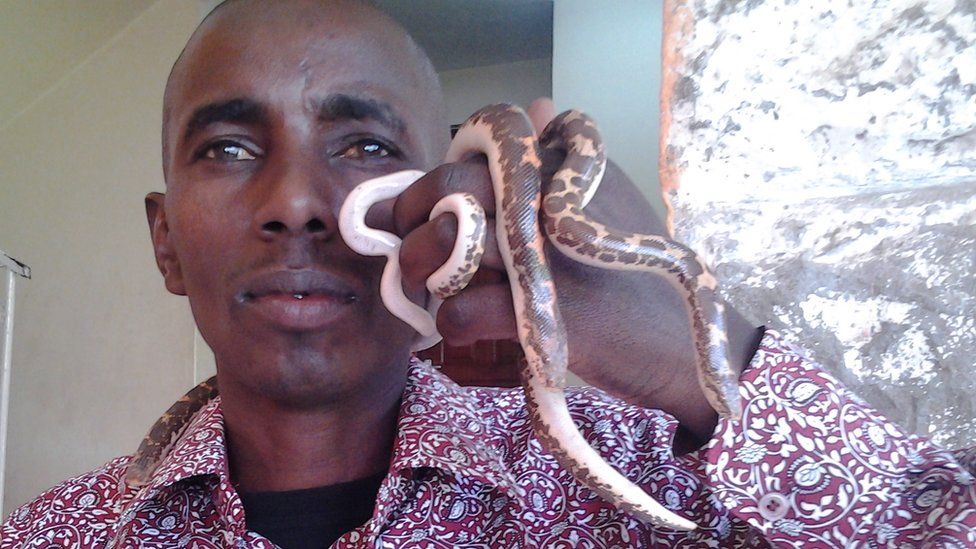
“For a start-up [snake farm] you need to raise not less than three million shillings or $30,000.”
Prof Germano Mwabu, a World Bank consultant economist at the University of Nairobi, adds that money is not enough, and that instead you need to be very knowledgeable about the reptiles.
“To be successful you have to know a lot about the ecology of snakes,” he says. “[For example], you have to have knowledge about their breeding.”
Back at Kioko Snake Ventures, Makau Kioko has a diploma in reptile management, so he more than knows the risks when he is catching cobras or wrestling pythons.
Source: BBC






























